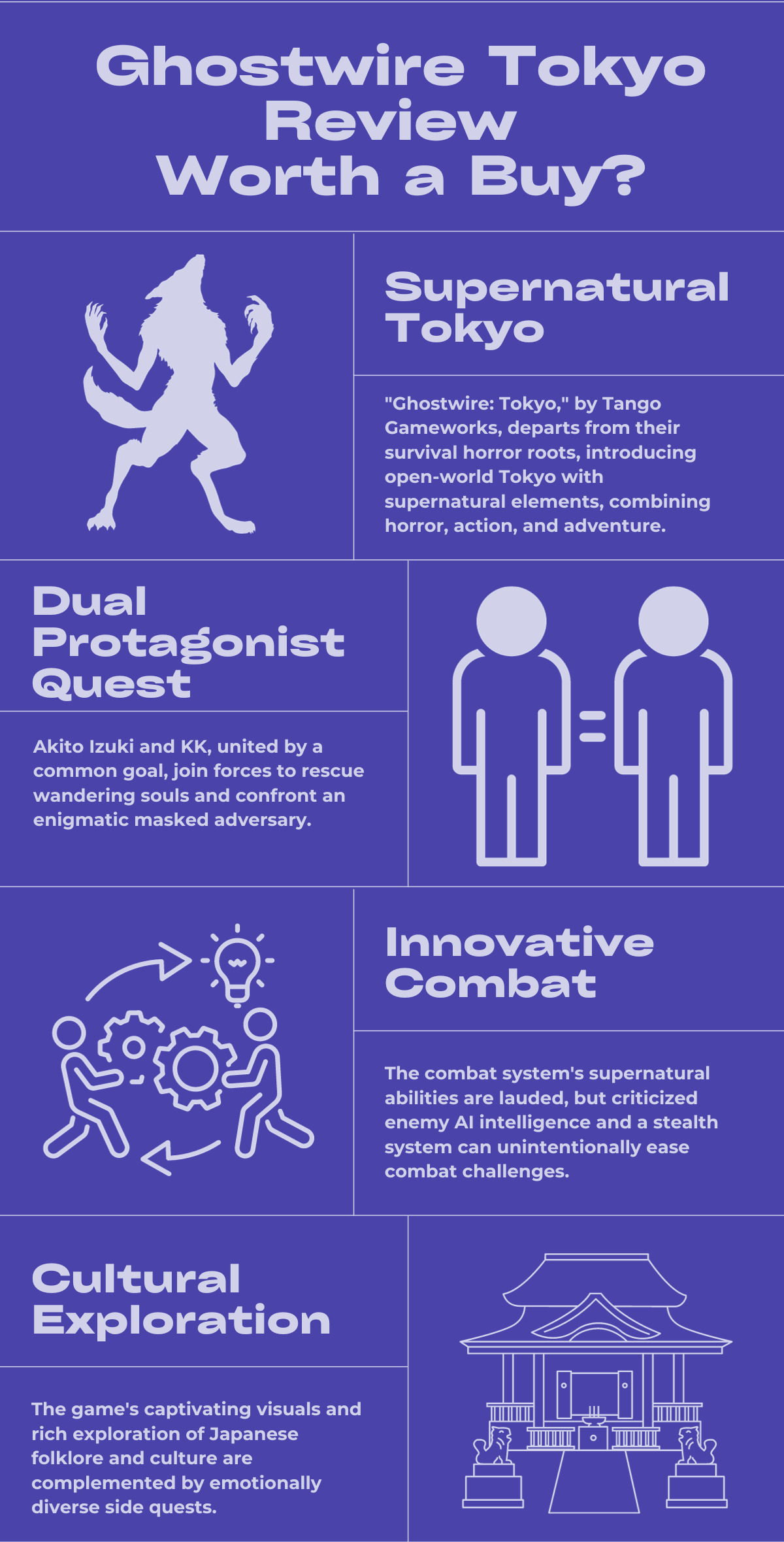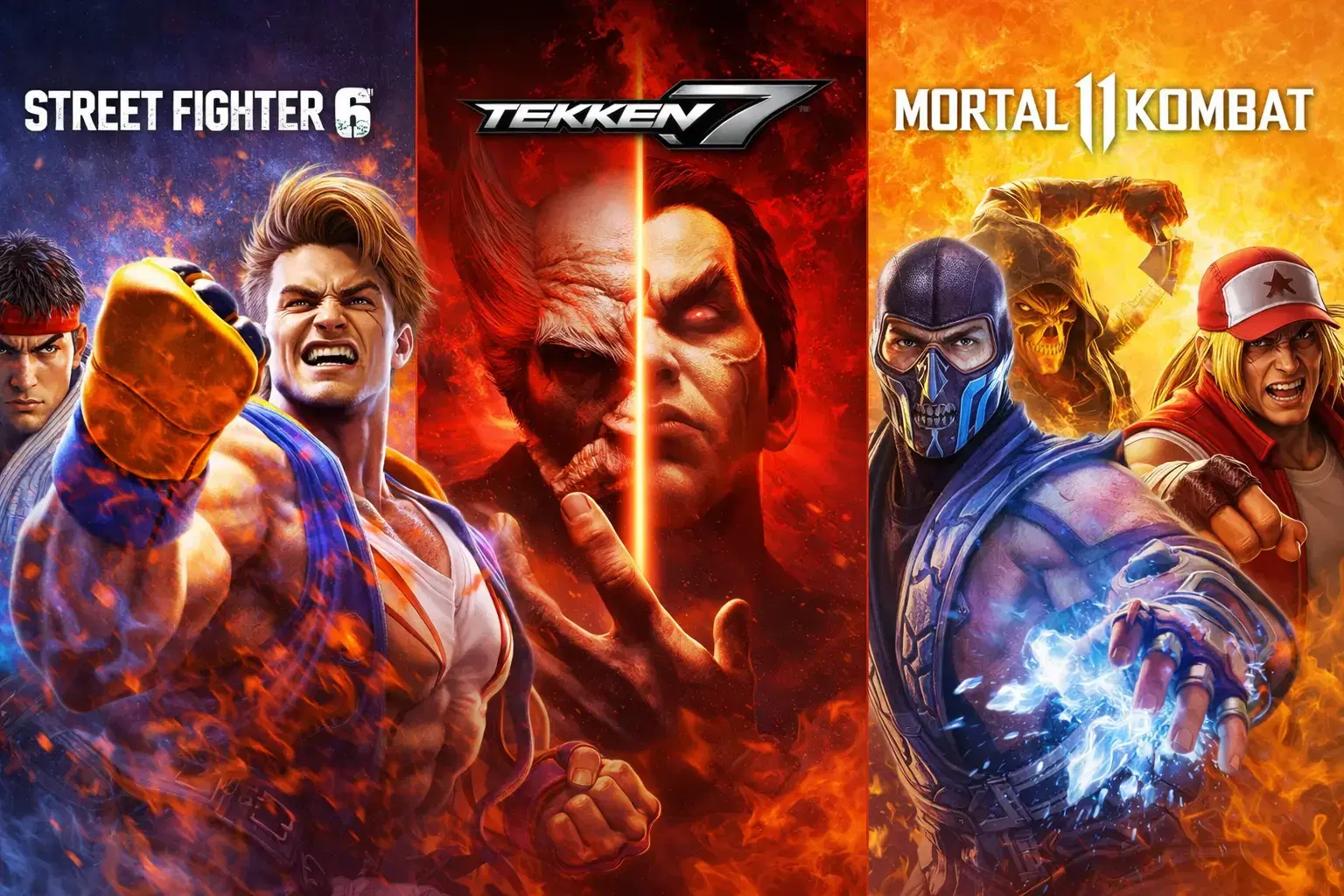| Release Date | March 25, 2022 |
| Developer | Tango Gameworks |
| Platform | PlayStation 5, Xbox Series X and Series S, GeForce Now, Xbox Cloud Gaming, Microsoft Windows |
| IGN Rating | 7/10 |
| Steam Rating | 9/10 |
Hey guys, we’re back with a new episode of Worth a Buy! I’m Arihead from Electronic First and in this Worth a Buy episode we’re gonna be talking about Ghostwire: Tokyo. In our last Worth a Buy episode, I reviewed Elden Ring, so if you’re curious to see my biased review, I suggest you check it out. Oh, and before we start, let me just say that the footage you’re seeing was recorded in the PC version and is mostly spoiler-free. And don’t forget to check out our store. At Electronic First, we give you the best games at the best prices, including Ghostwire: Tokyo.
Ghostwire: Tokyo was released amidst some of the most highly anticipated video games of recent years, including Elden Ring, Dying Light 2, and Horizon Forbidden West. Despite the stiff competition, Ghostwire Tokyo managed to stand out and impress players and critics alike.

One of the reasons for the game’s success is the development team behind it. Tango Gameworks, the studio responsible for Ghostwire Tokyo, is best known for their popular Survival Horror games, The Evil Within, and its sequel, The Evil Within 2. These games have earned a reputation for being some of the scariest and most atmospheric games of their genre, featuring complex storytelling, memorable characters, and nerve-wracking gameplay mechanics.
With Ghostwire Tokyo, Tango Gameworks decided to take a different approach. Instead of focusing solely on horror, they created a game that blends horror, action, and adventure in a unique and immersive way. The game’s setting, an open-world Tokyo filled with supernatural anomalies, is both beautiful and eerie, offering players a sense of freedom and exploration that is rare in horror games.
Ghostwire: Tokyo is a game that has been eagerly anticipated by fans of the horror genre, but as it turns out, the game has taken a different direction from its predecessors. The game was originally planned to be the third installment in the franchise, but somewhere along the way, the developers decided to stray from the horror genre and create something unique, stylish, and immersive. And it’s safe to say that they have succeeded in doing so.
The game takes place in an open-world Tokyo, which is rife with supernatural anomalies and set in perpetual night. The setting is both beautiful and eerie, and players will find themselves immersed in a world that is both familiar and otherworldly. The city is full of secrets and mysteries, and players will have to use all of their wits and skills to uncover them.
The game features two protagonists, Akito Izuki, and his uninvited guest, KK, who took possession of his body. The two form a partnership and become a Supernatural problem-solving duo, here to save the lost spirits of Tokyo and get revenge against the masked man behind it all. This dynamic adds an interesting twist to the game and makes for a compelling storyline.
While the game does retain some horror elements, it’s more of an Open-World Action-Adventure. Players will have to explore the city, battle supernatural creatures, and use their skills to solve puzzles and uncover the truth behind the mysterious masked man. The game’s combat system is unique and features a range of supernatural abilities that players can use to defeat their enemies.
Ghostwire: Tokyo is a game that immerses players in Japanese folklore and culture. The game’s enemies, known as Visitors, are some of the strangest and most interesting foes that players will encounter. These malevolent spirits roam the streets of Tokyo, adding to the game’s eerie atmosphere. The game’s aesthetic is based on Japanese folklore, which is reflected in the game’s visuals and design.
The game’s combat system is another highlight. It is intuitive, fun, and allows players to feel like a powerful supernatural being. The game also offers a range of movement options, which add to the game’s sense of freedom and exploration. Players can jump, climb, glide, and run around the rooftops of Tokyo, appreciating the stunning night view of the city.
The game’s graphics are also impressive, with the city of Tokyo being beautifully designed and rendered. The use of lighting and special effects adds to the game’s overall atmosphere, making it a joy to explore and experience.
Personally, though, I’ve been enjoying this game quite a lot. I guess it’s one of those games where you’ll know if it’s good for you or not in the first few moments. And sure, the controls might feel a little clunky at first. In particular, I had a much harder time playing with the preset camera settings. It was much too slow for the fast-paced and first-person combat, which by the way, is absolutely one of Ghostwire’s selling points. The combat is different from anything I’ve played before, as simple and arcade-like as it can be. And at first, it does seem to be quite the stress test in gaming ability, requiring you to aim, parry attacks and swap weapons and abilities best suited for the visitors you are up against. Some of the powers and abilities you can use in combat include firing off wind blasts, the starting ability, shooting with a bow, and launching fire attacks with great range or large AoE, depending on how long you charge.
It’s always been customary for me to play games in Hard mode in my first playthrough, and I’ll admit, it’s taken a couple of hours for me to truly get used to it. Once you do though, that’s probably when you’ve come to the painful realization that… the AI isn’t very smart. Sure, the enemies have a great style and flair to their design, but they are, for the most part, run of the mill-type foes you’ll find skulking about in other games. Moreover, Ghostwire: Tokyo features a stealth system. And it makes combat a breeze. Not in the level of Skyrim’s infamous Stealth Archer, but you do get to one shot enemies you sneak up against. Combine this with a basic enemy AI and you get a stealth focused adventure, rather than what the developers were clearly aiming for.
After all, I have nothing but praise for the combat mechanics.
Now, of course, stealth is an optional thing altogether, as far as I know. Listen, you don’t have to cheese the game if it means taking away the fun stuff it has to offer. If you keep a balance of stealth and normal combat, then it’ll be a great ride. However, my main gripe, the enemy AI, is an ordeal you’re just gonna have to learn to live with. Outside of the combat stuff though, Ghostwire: Tokyo actually has a lot to offer. Among the many things I like are the swift movement options you are privy to at the start of the game.
Ghostwire: Tokyo is a game that offers much more than what meets the eye. While it doesn’t market itself as such, the main character is actually pretty quick on his feet and can jump, climb, glide and run around the rooftops like you would in Dying Light. The controls are smooth and intuitive, and the movement mechanics are a joy to experience. This adds an extra layer of fun to the game and allows players to fully appreciate the stunning night view of Tokyo.
The map size may not be very large, but it is certainly filled to the brim with content. There are countless secrets to uncover, side quests to complete, and supernatural anomalies to battle. The game offers a range of gameplay mechanics that keep things interesting and engaging. Players will have to use their skills to solve puzzles, explore the city, and battle supernatural creatures.
But the visuals are probably the best part about this game. The developers have designed a beautiful Tokyo that is both familiar and otherworldly. The city is full of mystical elements based on real Japanese folklore, which just suck you in and immerse you in the world even more. The lost spirits appearing all around the city take a major role in the game, and players will have to use the Katashiro, a paper talisman, to put most of them to rest. Some spirits even give you side quests that not only give you worthwhile rewards but are interesting in and of themselves.
What’s interesting about the side quests is that, while the main story is quite dark, the side quests can be lighthearted, even wholesome at times. This adds a nice contrast to the overall tone of the game and makes for a more balanced experience. Players will find themselves invested in both the main story and the side quests, which offer a range of emotions and experiences.
The developer’s passion is very apparent here, and I truly appreciate that. And for you collectaholics out there, there’s also tons of stuff you can gather, such as the lost Tanukis, KK’s investigation notes and treasures, all offering rewards to boot, which is good.
You know, I’ve never been a fan of collectibles without worthwhile rewards. As you’ve noticed, I’ve been talking about all the side stuff before even getting to the main story. You could say it’s because this game is jam-packed with content that feels just as important as the main plot; like a multi-course meal with great appetizers. This game is no main course. I haven’t completed the game yet, but people have reported finishing the main plot at just 12 hours of play time. However, enjoying the rest of it is going to take a long time, and you can rest assured that they’ve made a significant effort in crafting great side content.
If you’re a fan of Japanese folklore, then Ghostwire: Tokyo is definitely worth considering. The game’s unique premise of being a first-person supernatural action-adventure with an underlying revenge story is engaging, and the open-world environment offers plenty of side quests to keep players entertained. As mentioned before, the game’s cool aesthetic is hard to describe, but it’s definitely something that sets it apart from other games in the genre.
One of the biggest draws of Ghostwire: Tokyo is its atmosphere. The game’s supernatural elements based on Japanese folklore create a tense and eerie atmosphere that keeps you on edge throughout the game. The Visitors, the game’s enemies, are some of the strangest foes you’ll come across, which adds to the game’s overall charm.
While the combat system is fun, it can become repetitive for some players. However, the game’s movement options, which allow you to jump, climb, and glide around the rooftops of Tokyo, are a refreshing change from the traditional movement options found in other games in the genre.
Overall, Ghostwire: Tokyo is a game that’s definitely worth a buy if you’re a fan of the supernatural action-adventure genre. With its engaging story, cool aesthetic, and immersive atmosphere, it’s a game that’s sure to keep you entertained for hours. And if you’re a fan of Japanese folklore, then you’re sure to appreciate the game’s unique take on it.
I’m only scratching the surface here with my early hands-on analysis. There’s a lot more to be said in Ghostwire: Tokyo. Most notably, its cool aesthetic is hard to put into words. I haven’t really seen anything like it and I’m already a fan. What do you guys think about Ghostwire Tokyo? I know this got rather mixed reviews, but I actually enjoyed this one a lot. Let us know what you guys think in the comment section below, we really hear from you. Also, we’re curious to know what Visitor scared you the most!
If you’re looking to purchase Ghostwire: Tokyo, electronicfirst.com is your go-to destination. They provide unbeatable deals on game keys, ensuring that you receive the most value for your money. Additionally, while you’re there, make sure to visit the electronic first blog, which offers gaming news and reviews, as well as helpful tips and tricks for your favorite games.
In a gaming industry that is oversaturated with titles that share similar gameplay mechanics, Ghostwire: Tokyo is a refreshing and distinctive game that stands out. If you’re a fan of action-adventure games that provide an original and immersive experience, purchasing Ghostwire: Tokyo is undoubtedly worth it. So, head over to electronicfirst.com today to obtain your game key, and be sure to explore the blog for all your gaming requirements.
Also if you’re interested in earning with Electronic First as soon as today, check out our affiliate program. You can share your link with friends, family or anyone. Sign up today to reap the rewards!
This is Arihead, signing out! Looking forward to the next one!





